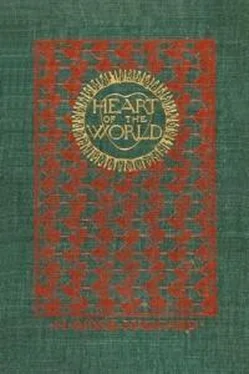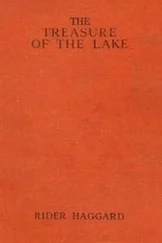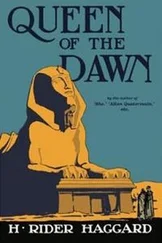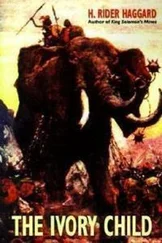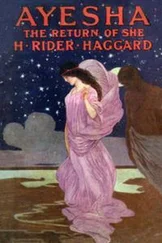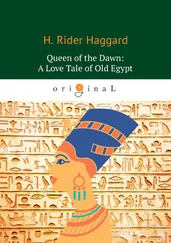Now the company shouted in applause, for they were set upon this strange union of a white man with their lady, if only because it was a new thing and touched their imagination; and even those of them who were of his party were wrath with Tikal on account of his ill behaviour and the cruel affront that he had offered to his new–made wife.
So soon as the tumult had died away, the old priest Dimas rose, and, taking the hands of Maya and the señor, he joined them and said a very touching and beautiful prayer over them, blessing them, and entreating the spirit, Heart of Heaven, and other gods, to give them increase and to make them happy in a mutual love. Lastly, he laid a white silken cloth, which had been prepared, upon their heads as they knelt before him, and, loosing the emerald girdle from about the waist of the bride, he took her right hand and placed it upon the arm of the señor, then he bound the girdle round wrist and arm, buckled it, and in a few solemn words declared these twain to be man and wife in the face of Heaven and earth till death undid them.
Now the cloth was lifted and the girdle loosed, and, standing upon their feet, the new–wed pair kissed each other before the people. A shout of joy went up that shook the panelled roof, and one by one, in order of their rank, the guests pressed forward to wish happiness to the bride and bridegroom, most of them bringing some costly and beautiful gift, which they gave into the charge of the waiting–ladies. Last of all came the old priest Dimas, and said:
"Sweet bride, the gift that I am commanded by the Council to make to you, though of little value in itself, is yet one of the most precious to be found within the walls of this ancient city, being nothing less than the holy symbol of the all–seeing Eye of the Heart of Heaven, which, through you, men behold to–day for the first time for many generations. Wear it always, lady, and remember that though this jewel has no sight, yet that Eye, whereof it is a token, from hour to hour reads your most secret soul and purpose. Make your thoughts, then, as fair as is your body, and let your breast harbour neither guile nor evil; for of all these things, in a day to come, you must surely give account."
As he spoke he drew from the case that hid it nothing less than that awful Eye which we had seen within the hollow of the Heart, when with unhallowed hands we robbed it, substituting the false for the true. Now it had been set in a band of gold and hung to a golden chain which he placed about the neck of the bride, so that the red and cruel–looking gem lay gleaming on her naked breast. Maya bowed and muttered some words of thanks, but I saw that her spirit failed her at the touch of the ominous thing, for she turned faint and would have fallen had not her husband caught her by the arm.
While the señor and his wife were receiving gifts and listening to pretty speeches, a number of attendants had brought tables laden with every kind of food from behind the pillars where they had been prepared, and at a signal the feast began. It was long and joyous, though joy seemed to have faded from the face of Maya, who sat neither eating nor drinking, but from time to time lifting the red eye from her breast as though it scorched her skin. At length she rose, and, accompanied by her husband, walked bowing down the hall to the court–yard, where bearers waited for them with carrying–chairs. In these they seated themselves, and a procession having been formed, very long and splendid, though I will not stay to describe it, we started to march round the great square to the sound of music and singing, our path being lit by the light of the moon and with hundreds of torches. Here in this square were gathered all the population of the City of the Heart, men, women, and children, to greet the bride, each of them bearing flowers and a flaming torch; and never have I seen any sight more beautiful than this of their welcome.
The circuit of the square being accomplished, the procession halted at the palace gates, and many hands were stretched out to help the bride and bridegroom from their litters. It was at this moment that I, who was standing near, felt a man wrapped in a large feather cloak push past me, and saw that he held something which gleamed like a knife.
By instinct, as it were, I cried, "Beware, my friend!" in Spanish, and in so piercing a voice that it caught the señor's ear. He swung round, for already he was standing on his feet, and, as he turned, the man in the cloak rushed at him and stabbed with the knife. But, being warned, the señor was too quick for him. Springing to one side, with the same movement he dealt his would–be murderer a great buffet, that caused him to drop the dagger and sent him staggering into the dense shadow of the archway.
For some seconds no one seemed to understand what had happened, and when they did and began to search for the man, he was not to be found. Who he was, or why he had attempted this cowardly deed, was never discovered; but for my part I have little doubt that either Tikal himself or some creature of his was wrapped in the dark feather cloak, and sought thus to rid him of his rival. Indeed, as time went on, this belief took firm hold of the mind of the people, and was one of the causes that led to the sapping of Tikal's power and popularity.
Very hastily the señor assured the lords in attendance who crowded round him that he had received no manner of hurt, and then, after speaking a few brief words of thanks, he withdrew into the palace with his wife, and I saw him no more that night.
The day of this marriage was to me the beginning of the longest and most weary year that ever I have spent in a long and weary life. Very soon I understood how it came about that Maya had learned to hate the City of the Heart in which she was born, its people, and its ways, and ardently to desire a new life in new lands. Here there was no change and little work; here, enervated by a cloying luxury, the poor remnant of a great civilisation rotted slowly to its fall, and none lifted a hand to save it. Since men must do something, the priests and nobles plotted for place and power indeed, and the common people listlessly followed this trade or that, providing food and raiment for the community—not for themselves—but there was little heart in what they did, and they took no pleasure in it. Basking in the eternal sunshine, they loitered from the cradle to the grave, hoping nothing, suffering nothing, fearing nothing, content to feast amid their crumbling palaces, and, when they were weary, to sleep till it was time to feast again, satisfying their souls the while with the husks of a faith whereof they had lost the meaning. Such were the people of whom Zibalbay hoped to fashion a race of conquerors!
Still, to this life they were born and it became them; indeed, they could have endured no other, for the breath of hardship must have melted them away as my Indian forefathers melted beneath the iron rule of the Spaniard, but to me it was a daily torment. Often I have beheld some wild creature pine and die in its prison, though food was given to it in greater abundance than it could find in its native woods, and like that wild creature was I in this soft City of the Heart.
The wealth I came to seek was round me in abundance, useless and unproductive as the dead hands that had stored it, and yonder in Mexico were men who by aid of that wealth might become free and great: but alas! I could not bring them together. I could not even escape from my gaol, for my every movement was watched. Yet I would have tried to do so had it not been for the señor, who, when I spoke of it, said I should be no true friend of his if I went and left him alone in this house of strangers. Indeed his plight was worse than mine, for he too soon grew utterly weary of this dreadful city of eternal summer, and of everything in it except his wife. For whole hours we would sit gazing on the wide waters of the lake, and make plan after plan whereby we might gain the mountains and freedom, only to abandon each in turn. For they were hopeless. Day and night he was watched, since here alone this people forgot to be indolent. They knew that their race was dying and, lifting no hand to save themselves, they preferred to pin their faith upon the prophecy which promised that from this white man should spring a saviour. Meanwhile, false though it may have been, the prophecy, or one part of it, was in the way of fulfilment, which in itself was a wonder to this people, among whom the births of children were so rare. At length that child was born—a son—and the rejoicing knew no bounds. Strangely enough, upon the same day Nahua also gave birth to a son, and great was her anger when she learned that it was not on her account or on that of her offspring that the people were so glad.
Читать дальше
